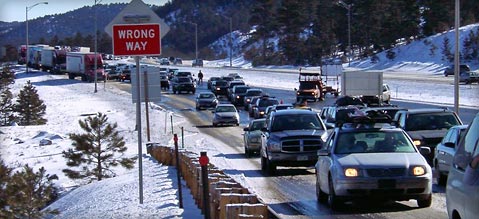Widgetized Section
Go to Admin » Appearance » Widgets » and move Gabfire Widget: Social into that MastheadOverlay zone
Colorado Senate sends transportation funding bill to Polis for signature

Lawmakers in the Colorado General Assembly on Wednesday gave final approval to a $5.3 billion transportation funding package, sending the historic measure to Gov. Jared Polis’ desk to be signed into law.
Senate Bill 21-260, which sponsors say will provide a “future-proofed” funding source for transportation through a variety of new fees levied on consumers, was passed by the Democratic-controlled House on a party-line, 40-24 vote, following approval by the Senate in May. Because the bill was amended last week by the House, the Senate then repassed the measure on Wednesday afternoon, leaving SB-260 one signature from Polis away from becoming law and ending a years-long effort by lawmakers to strike a deal on a major boost to state transportation spending.
House Speaker Alec Garnett, a Democrat from Denver, said that while the bill wasn’t perfect, it represented a worthy compromise that would help to address long-running funding shortages for state and local transportation needs.
“You have one side that says, ‘Only asphalt, concrete and bridges,’” Garnett said on the House floor prior to Wednesday’s vote. “On the other side, you have stakeholders who say, ‘No more roads, no more lanes.’”
The bill, whose most prominent backers are business groups and local governments, would spend about $5.3 billion on transportation infrastructure over the next decade. About 10% of that total, or $568 million, would be spent on public transit and pedestrian improvements. Another $724 million would go towards efforts aimed at accelerating the transition to electric vehicles, while most of the remaining $4 billion would be spent on maintenance, new construction and debt repayments on road and highway projects.
To raise the new revenue, the bill will create a new per-gallon fee on gasoline sales, starting at 2 cents per gallon next year and rising to 8 cents by 2028. Rideshare trips and online deliveries would also be subject to a range of new fees, and registration fees on electric cars would be raised in an effort to ensure “parity” with the fees and taxes paid by drivers of gas-powered vehicles. New fees would cover about $3.8 billion of the bill’s price tag, while the rest would come from the state’s general fund and federal stimulus money.
“The best solution for transportation funding that the state of Colorado has ever had in the last 10 years is before you today,” Garnett told his fellow lawmakers. “It strikes the right balance.”
The bill underwent several rounds of amendments aimed at strengthening provisions that address air pollution from cars and highways, which disproportionately impact low-income communities and people of color. One amendment adopted by House lawmakers last week would create a new “environmental justice and equity branch” within the Colorado Department of Transportation.
<div class="newsroomSidebar "><strong>“The best solution for transportation funding that the state of Colorado has ever had in the last 10 years is before you today.”</strong> — <em>Colorado House Speaker Alec Garnett</em> </div>While the bill earned the support of the Boulder-based Southwest Energy Efficiency Project, many other environmental groups and advocates for multimodal transportation remain skeptical. Danny Katz, executive director of the Colorado Public Interest Research Group, said that while there were “noticeable improvements” to SB-260 following its introduction last month, it still falls short.
“Ultimately this bill is a missed opportunity,” Katz wrote in an email. “We don’t need more cars on our highways or in our downtowns or flying through our neighborhood streets where our kids play. This bill fails to put enough guardrails in place to ensure dollars invested in roads are focused on fixing what we got first and foremost, and secondly providing fast, frequent and reliable options like transit so we all don’t have to pile into our cars to do everything.”
Republican lawmakers, meanwhile, used Wednesday’s floor debate to lodge a variety of complaints against the bill, including its reliance on new fees, which state Rep. Patrick Neville of Castle Rock said would “break the backs of our middle class citizens.”
At the same time, many Republicans argued that the bill doesn’t spend enough money on roads and highways, criticizing its funding for vehicle electrification and multimodal infrastructure.
“Our cities developed around the automobile and should respect the automobile,” said Rep. Matt Soper, a Republican from Delta. “We’re going to be tying up the state’s resources, we’re taking more hard-earned dollars from Coloradans, and we’re not necessarily going to be putting this where it needs to be.”
But Rep. Matt Gray, a Democrat from Broomfield and a lead sponsor SB-260, said prior to Wednesday’s vote that the impact of the bill’s “historic investments” in roads and other infrastructure would be felt all across the state.
“This bill is not for any one group of constituents,” Gray said. “It’s not just for rural Colorado. It’s not just for suburban Colorado. It’s not just for urban Colorado. It’s for all of Colorado.” HELP US GROW Make a tax-deductible donation.
Editor’s note: This story first appeared in Colorado Newsline, which is part of States Newsroom, a network of news outlets supported by grants and a coalition of donors as a 501c(3) public charity. Colorado Newsline maintains editorial independence. Contact Editor Quentin Young for questions: info@coloradonewsline.com. Follow Colorado Newsline on Facebook and Twitter.
Chase Woodruff
Latest posts by Chase Woodruff (see all)
- Evans, Boebert defend Medicaid cuts as protesters shout them down in Denver - May 30, 2025
- Colorado officials envision Mountain Rail by 2026, Denver to Boulder to Fort Collins by 2029 - May 19, 2025
- Colorado’s Evans votes in favor of bill that will kick at least 7.6 million people off Medicaid coverage - May 15, 2025


